| THE LIBRARY
OF THE ELLINIKOS PHILOLOGIKOS SYLLOGOS (GREEK PHILOLOGICAL SOCIETY)
OF CONSTANTINOPLE
|
|||
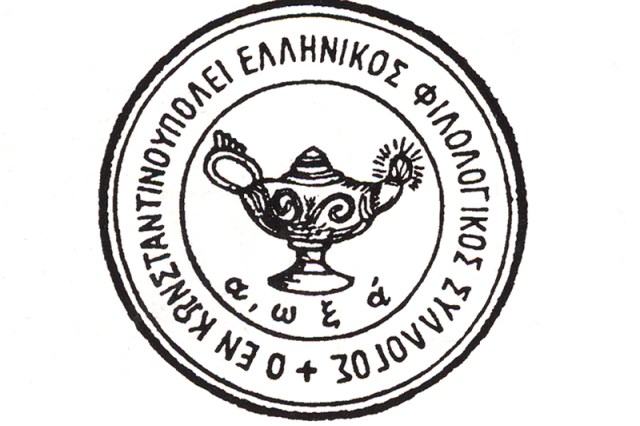 |
The Greek Philological Society of Constantinople, one of the leading and most active Greek cultural societies of the 19th and the early the 20th century, was established in 1861 on the initiative of medical doctor and intellectual Heroklis Vasiadis (1821-1890) [1] with the financial support of Georgios Zarifis and Christakis Zografos, prominent bankers from Galata.[2] The Society operated uninterruptedly approximately until 1923. | ||
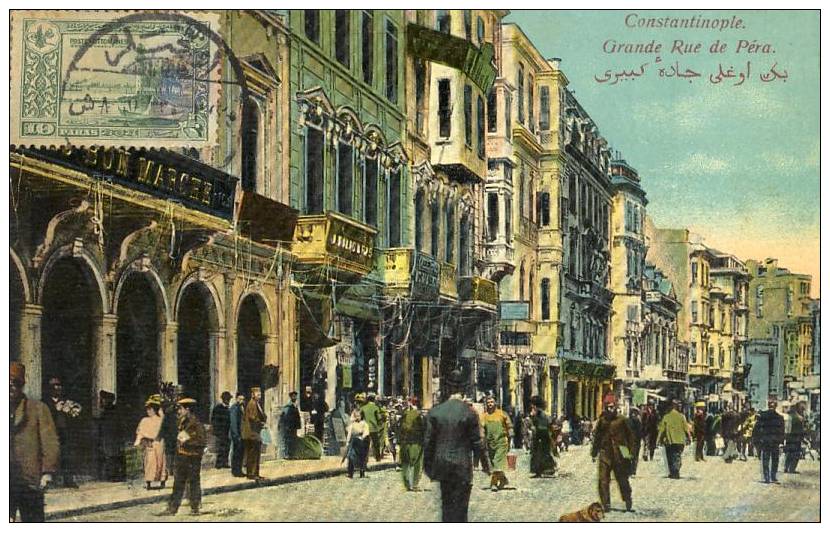 Pera, "Grande Rue"
|
The establishment of the Philological Society falls, not by coincidence, in a period when the Hatt-ı Hümayun reforms (1856) had created a favourable climate for the economic and demographic growth of the Greek bourgeoisie in the Ottoman Empire. The prosperity that ensued spurred the development of intense intellectual activity, which was often spearheaded by the numerous Greek societies that emerged in the second half of the 19th century in Eastern Thrace and Asia Minor.[3] Constantinople saw the establishment of three cultural societies: first, the "Medical Society" (1861), aimed at researching ancient medicine and disseminating medical knowledge, then the "Philological Society" (1861), and finally, the "Music Society" (1863) which sought to promote the study of ancient music and to foster musical knowledge.[4] The interest in Greek antiquity, which is clearly manifested in the goals of all three Constantinopolitan societies, is indicative of the role that this type of associations played in the formation of the collective identities of the Greeks in the Ottoman Empire during the second half of the 19th and the beginning of the 20th century.[5]
The establishment of the Philological Society was motivated by the common interest of the members in philology. As stipulated in the Regulations adopted on December 14, 1861: "Article 1. The goal of the Society shall be the written or oral discussion of philological matters. Article 2. Any political discussion is hereby forbidden".[6] The Society was housed in a building in the neighbourhood of Pera (now Beyoğlu) and began its operation on April 15, 1861.[7]
|
||
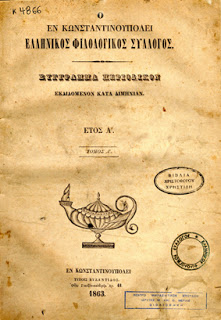 The first volume of the journal
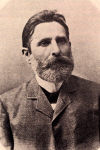 A. Papadopoulos-Kerameus
|
On March 11, 1863, the members decided to launch a bimonthly journal, which would bear the name of the Society and would aim at: "making the most noteworthy activities of the Philological Society known to the general public and compensating for the lack of a serious philological journal in our community", as noted in the relevant regulation.[8] The Constantinople Greek Philological Society circulated from 1863 until 1914 or 1915, publishing mainly articles of philological, archaeological and historical nature, proceedings of conferences organised by the Society and reports on various intellectual, scholarly or educational activities of the members.
As some researchers surmise, the publication of the journal created the need for a library and served as an impetus for establishing one.[9] Since the initial Regulations of the Society contained no such provisions, on April 30, 1864, the members adopted new regulations stating their intention to set up a library, open a reading room and take turns serving as head librarian. In the period 1864-1912, several eminent intellectuals of the time assumed this task, influencing the nature of the library with their choices.
Among them, one could distinguish philologists Miltiadis Pantazis (1850-1907), Georgios Chasiotis (*1842) and Themistoklis Saltelis (1835-1903), the prominent philologist and bibliographer Athanasios Papadopoulos-Kerameus (1856-1912), the scholar Vasilios Mystakidis (1859-1933) and the linguist and distinguished researcher of the Greek community in Pontus Dimosthenis Oikonomidis (1858-1938).
Two of the Society's librarians have a close relation to Cyprus: the German epigraphologist Paul Schroeder (1844-1915) – interpreter at the German Embassy in Constantinople in the period 1869-82, later known for his research on the ancient inscriptions in Cyprus, his interest in mapping the island (in collaboration with Heinrich Kiepert) and his work on documenting Cypriot folk songs,[10] and the philologist Dimitrios Sarros (1870-1937), originally from Zagori, who worked as a teacher in Larnaca and served as director of the Pancyprian Gymnasium.[11]
|
||
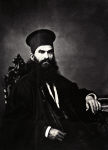 Neofytos, Bishop of Derkoi
|
The first major acquisition of printed editions for the Philological Society Library took place in 1864, in Berlin, by the well-known physician and member of the Society, Stefanos Karatheodoris.[12] That same year, with the mediation of deacon Evgenios Mantsavinos, the Library also obtained its first manuscripts: two codices of the 12th and the 19th century.[13] Frequent offerings and donations, mainly by members of the Society, contributed to the rapid increase in acquisitions and in 1869, the Library began functioning as a public reading room as well.[14] Shortly afterwards, however, in May 1870, the Library and the Society's archives were completely destroyed in a widespread fire that broke out in Pera.
Despite the great loss suffered, the Society continued to operate. With the generous donations of printed books and money offered by cultural societies ("Parnassos", Association for the Dissemination of Greek Letters), public institutions (University of Athens) and private individuals (Loukia Karatheodori, Alexandros Rizos Rangavis, Nikolaos Dragoumis, Athanasios Vernardakis, Konstantinos Sathas, to name just a few), the Library was rebuilt from scratch, setting as a goal to operate as a public library.
As early as May 1872, the then president of the Society, K. Karapanos, noted the progress made: "The library of the Society, which burned entirely on the tragic day of May 24 in the fire that wreaked destruction on our city, began picking up again as previously, owing to those individuals who set on to restore the Society after that devastating fire. Further enriched with generous donations from culture-minded compatriots, the library now comprises nearly 800 volumes".[15]
A year later in 1873, the collection had reached 2.000 volumes. In November that same year, the Library received one of the most valuable donations of manuscripts in its history. The Bishop of Derkoi, Neofytos (1820-1875), endowed the Society with 33 codices.[16]
|
||
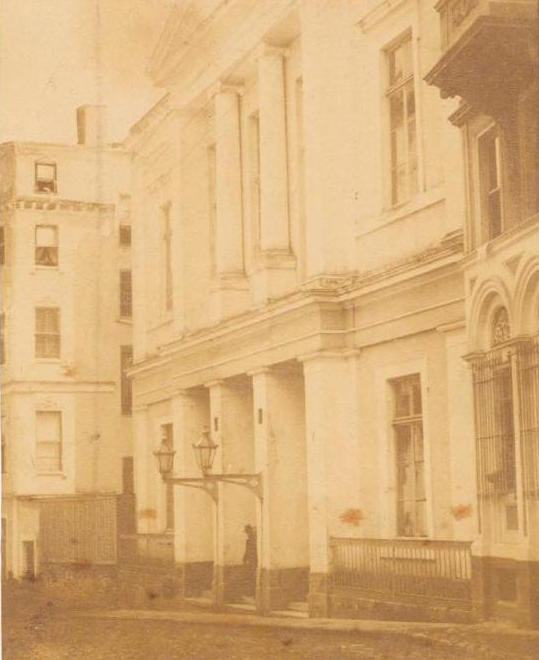 Society's building: Topçekenler Street, Pera
(Photo: 1888)
 Manouil Gedeon
|
1873 was generally a milestone year as it saw the inauguration of the Society's new building whose construction, on Topçekenler Street in Pera, had begun in 1872; shortly afterwards (1874/5), the Library would also be relocated there.[17] The neoclassical building would serve as the Society's headquarters until the end of its operation. The first Operating Rules of the Library and the Reading Room were also adopted in 1873.[18]
In the beginning of 1876, the Society's Library was declared public. At that point, its collection comprised 4.000 volumes and 45 manuscripts.[19] As pointed out by palaeographer Paul Moraux, to whom we owe the most comprehensive and consistently compiled catalogue of the codices acquired by the Society, the reports of the head librarians, published in the Society's journal, allow today's researchers to track very accurately the development of the Library.
Those who contributed to the Society's most valuable acquisitions in manuscripts include – apart from Deacon Neofytos – lawyer Christos Papadopoulos, historian Manouil Gedeon, diplomat Ioannis Aristarchis, and brothers Stavros and Theodoros Afthentopoulos.
Christos Papadopoulos who served as Chairman of the Commercial Court in Cyprus in the period 1880-1889/90, donated to the Society nearly 20 manuscripts. In 1895, the famous scholar Manouil Gedeon (1851-1943) made a donation of five codices, while in 1916 sold to the Library another thirty codices.[20] Ioannis Aristarchis (1811-1897), member of a prominent Phanariot family and ambassador of the Sublime Porte in Berlin, bequeathed to the Society 33 codices containing letters, diaries, travel accounts and other material related to his diplomatic activity.[21] The Afthentopoulos brothers contributed in 1905 six 19th-century manuscripts comprising collections of ecclesiastical hymns.
As the last decade of the 19th century dawned, in 1890/1, the Library's collections had increased dramatically. Printed books had reached 12.526 volumes. The catalogues of new acquisitions, published on a regular basis in the Society's journal, allow us to reconstruct quite precisely the nature of the Library as it emerges from the contents of its printed collection. Printed books covered a wide range of subjects. In terms of numbers, the largest share included publications related to Greek antiquity (ancient Greek literature, archaeology), history, religion, education, and language. Though less numerous, books reflecting more contemporary interests (statistics, political science, ethnology) were also present.[22] Remarkably high was the share of medical books, apparently because of the pronounced presence of physicians among the Society's members.[23] Publications vary quite a lot in terms of language, as well. Apart from books in Greek and in Turkish, one can also find works in French, English, German and Italian, with French clearly dominating among foreign language publications.
|
||
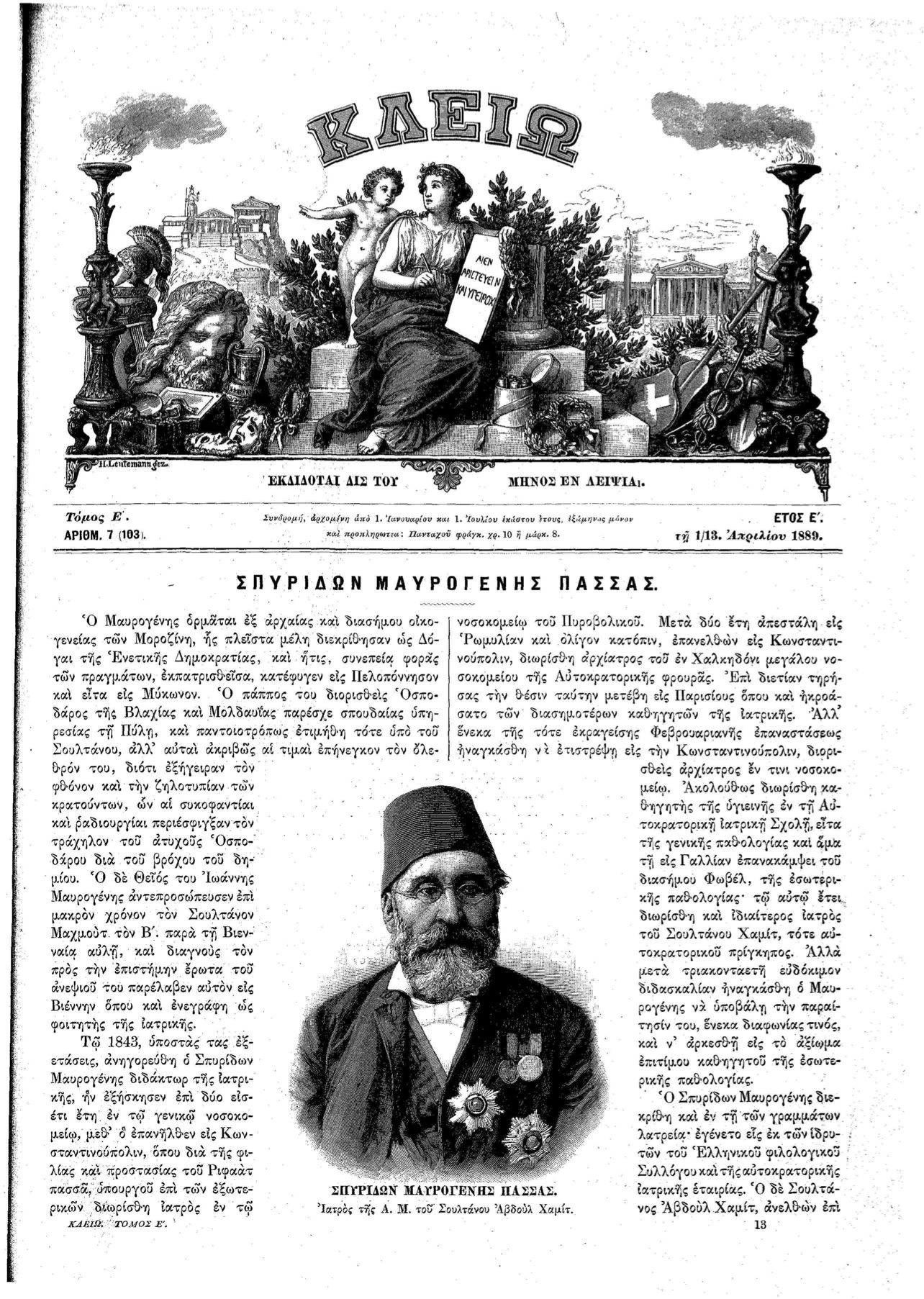 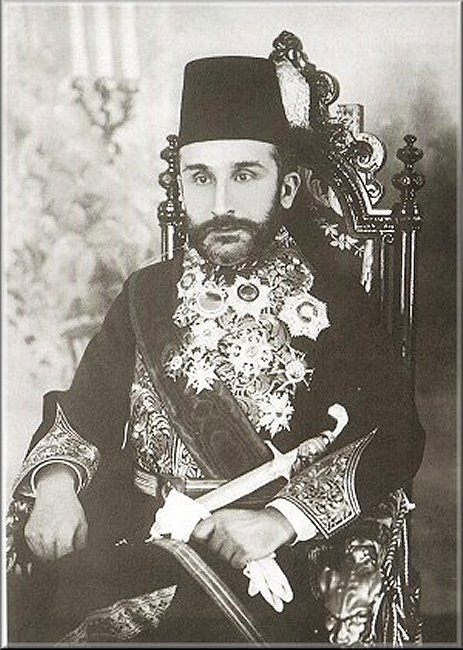 Alexandros Mavrogenis
|
In the years that followed, towards the end of the 19th century, one can discern a decline in the Library's rate of acquisition. In the first years of the 20th century, however, the Philological Society obtained three private libraries bequeathed by: Ioannis Aristarchis (1177 vols.), Ioannis Valettas, a Greek intellectual who lived in London (2740 vols.), and Spyridon Mavrogenis (1396 vols.). The Prince of Samos Alexandros Mavrogenis supplemented the latter donation with 45 volumes.[24] Later on, in 1908-1910, the Library would also be enriched with new valuable private collections. These include the library of K. Stavridis, interpreter at the British Embassy (376 volumes and 429 pamphlets), the library of Konstantinos Anthopoulos (632 volumes and 8 pamphlets), the library of the medical doctor Stekoulis (294 volumes and 494 pamphlets) and the library of Nikolaos (;) Photiadis (450 volumes and 24 pamphlets).[25] By 1910, the Library of the Philological Society comprised 18.035 volumes, 666 journals and 1.537 pamphlets.[26]
In the extremely difficult period 1912-1921, the activities of the Society declined but did not cease completely. In 1916, the Library bought thirty manuscripts from Manouil Gedeon.[27] In the years 1918-1922, when the Philological Society knew a final upsurge, the Library was under the care of Noemi Zoirou – the first and only woman in the Society's Presidium. In that period, new sponsors made it possible for the Society to expand the facilities of the Library and purchase significant quantities of books.[28] New acquisitions reached 8.000 volumes – 5.000 of which were donated by the former president of the Society, Alexandros Zoiros.[29]
This upward trend was violently interrupted by the Asia Minor Catastrophe. The Law on Associations (1923) forced all Greek societies, the Philological Society included, to cease operation. The exact year in which the Society closed down, remains unknown. In 1925 all its moveable and immoveable property was confiscated.[30] At that time, the Library must have comprised approximately 28.000 volumes and 183 manuscripts.[31] The fate of the Library between 1925 and 1931 is unclear.
Paul Moraux traced the convoluted path of the Society's printed and manuscript collections after 1931 as follows:
|
||
|
|
|||
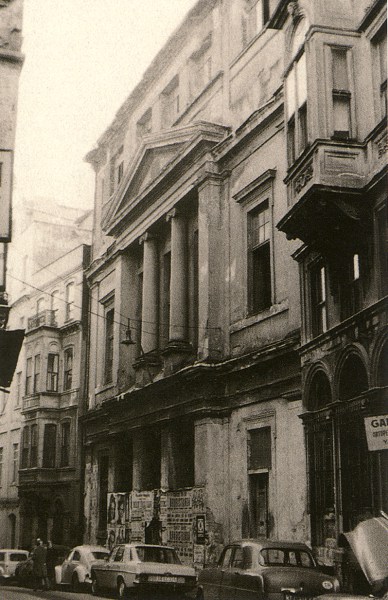 |
"We find the Library's traces again as late as 1932, when the Turkish authorities divided its contents among different societies. The Turkish Historical Society (Türk Tarih Kurumu), founded on the initiative of Ataturk and generously endowed by him, got the lion's share. The Linguistic Society (Türk Dil Kurumu) and the Ankara General Library (Ankara Genel Kitaplığı) shared the rest. Some old editions of classical works were given to the Classical Philology Seminar at the Faculty of Letters (Dil ve Tarih Coğrafya Fakültesi) in Ankara, while the archives of the Philological Society remained in Constantinople, in the Süleymaniye Library, where they seem to be kept to this day [=1969]. The Historical Society chose to accept only part of the works they were offered: they kept all the manuscripts, all the printed books that had to do with history and its related sciences, and some journals, a total of 5.348 volumes. The rest was consigned to the "People's House" (Halk Evi) in Ankara – after it closed down, its library passed over to the Turkish Hearths (Türk Ocakları), where it is still kept [=1969]. Finally, it should be noted that since 1956 the books given to the General Library in 1932, have been kept at the National Library (Milli Kütüphane)" [32]
Out of the 183 manuscripts that have been estimated to exist in the Library of the Philological Society, 149 have been preserved – according to Moraux's bibliography. The Library of the Turkish Historical Society, which – as mentioned – holds them today, has digitized them.
|
||
|
The building of Syllogos
on the Topçekenler Street
|
|
||
|
✦✦✦✦✦✦✦✦✦ |
|||
| [1] Bibliographical information on Heraklis Vasiadis can be found in the speech delivered by Konstantin Kalliadis at a meeting of the Philological Society in 1891, after the death of its founder. The speech was published in the Society's journal, see: Ὁ ἐν Κωνσταντινουπόλει Ἑλληνικὸς Φιλολογικὸς Σύλλογος 21 (1891), p. 20-33.
[2] Giorgos A. Giannakopoulos, "Η βιβλιοθήκη του Ελληνικού Φιλολογικού Συλλόγου Κωνσταντινουπόλεως (1863-1922)", Δελτίο Κέντρου Μικρασιατικών Σπουδών 6 (1986/7), p. 287-322, p. 287 here. G. Giannakopoulos's article also provides valuable older bibliographical sources. The most comprehensive studies on the Philological Society available so far are the following: Haris Exertzoglou, Εθνική Ταυτότητα στην Κωνσταντινούπολη τον 19ο αι. Ο Ελληνικός Φιλολογικός Σύλλογος Κωνσταντινουπόλεως (1861-1912), Athens: Polis, 1996 and Giorgos A. Giannakopoulos, "Ο Ελληνικός Φιλολογικός Σύλλογος Κωνσταντινουπόλεως (1861-1922): Η ελληνική παιδεία και επιστήμη ως εθνική εθνική πολιτική στην Οθωμανική Αυτοκρατορία", unpublished doctoral dissertation, National and Kapodistrian University of Athens, Faculty of Law, Economics and Political Science, Athens 1998. A concise but comprehensive overview of the history and ideological context of the Society is provided in H. Exertzoglou's article on the Philological Society in the Encyclopaedia of the Hellenic World.
[3] Giannakopoulos, «Η βιβλιοθήκη του Ελληνικού Φιλολογικού Συλλόγου», p. 287-288.
[4] Ὁ ἐν Κωνσταντινουπόλει Ἑλληνικὸς Φιλολογικὸς Σύλλογος 1 (1863), p. δ´.
[5] As regards this role it would be interesting to examine possible differences between the various forms of association. Secret associations, for instance, inasmuch as freemason systems are involved, has a priori a cosmopolitan nature that – one would assume – goes against the promotion of ethnic elements. Freemasonry was widespread among the Greeks of Constantinople in the second half of the 19th and the first decades of the 20th century, see the rich material presented by Giannis Samaras in his study Η Στοά «Αρμονία» υπ' αριθ. 44 εν Ανατ. Κωνσταντινουπόλεως, Athens: Stoa Armonia Publications, 2010.
[6] Ὁ ἐν Κωνσταντινουπόλει Ἑλληνικὸς Φιλολογικὸς Σύλλογος 1 (1863), p. ε´.
[7] The first meeting of the Philological Society founding members took place on 15.04.1861, while the first charter was adopted on 14.12.1861. The founding members numbered 86. See: Paul Moraux, Catalogue des manuscrits grecs, Ankara: Türk Tarih Kurumu, 1964, p. iii. Detailed lists with the names of the members were published in the Society's journal. According to Moraux, the first building that housed the Society was located on Turnacı Başı Street. Later, the headquarters were relocated to another building, also in Pera. This second building was destroyed by fire in 1870, ibid., p. iv.
[8] Ὁ ἐν Κωνσταντινουπόλει Ἑλληνικὸς Φιλολογικὸς Σύλλογος 1 (1863), p. δ´.
[9] Giannakopoulos, «Η βιβλιοθήκη του Ελληνικού Φιλολογικού Συλλόγου», p. 289 ff; the author also provides information on how the Library operated. According to Konstantinos Kalliadis, the establishment of the Library was suggested by the Society's founder Heraklis Vasiadis, see the details offered by Kalliadis in his speech on Vasiadis: Ὁ ἐν Κωνσταντινουπόλει Ἑλληνικὸς Φιλολογικὸς Σύλλογος 21 (1891), p. 20-33.
[10] Hans A. Pohlsander, "Schroeder, Paul G. A.", in: Neue Deutsche Biographie, vol. 23 (2007), p. 572.
[11] A list with the names of the head librarians is provided in Giannakopoulos, «Η βιβλιοθήκη του Ελληνικού Φιλολογικού Συλλόγου», p. 315-316.
[12] Ibid., p. 290.
[13] Moraux, Catalogue des manuscrits grecs, p. v.
[14] Giannakopoulos, «Η βιβλιοθήκη του Ελληνικού Φιλολογικού Συλλόγου», p. 290.
[15] Karapanos, Ἔκθεσις τῶν κατὰ τὸ 1871-72 πεπραγμένων ἀναγνωσθεῖσα ἐν τῇ ἐπετεἰῳ πανηγύρει τοῦ ἐν Κωνσταντινουπόλει Ἑλληνικοῦ Φιλολογικοῦ Συλλόγου, Constantinople: I. A. Vretos, 1872, p. 22.
[16] A concise description of this type of manuscripts is available in Moraux, Catalogue des manuscrits grecs, p. x.
[17] Κ. Karapanos, Ἔκθεσις τῶν κατὰ τὸ 1871-72 πεπραγμένων, p. 25-26 and Giannakopoulos, «Η βιβλιοθήκη του Ελληνικού Φιλολογικού Συλλόγου», p. 292.
[18] Operating Rules of the Library and the Operating Rules of the Reading Room are republished by Giannakopoulos, ibid., p. 293 ff.
[19] Moraux, Catalogue des manuscrits grecs, p. vii.
[20] Ibid., p. xii.
[21] Ibid., p. xvi. As noted by Moraux, 11 of those codices are now preserved in the Library of the Turkish Historical Society (Türk Tarih Kurumu) in Ankara. The rest are missing.
[22] See the list of titles published by Giannakopoulos, «Η βιβλιοθήκη του Ελληνικού Φιλολογικού Συλλόγου», p. 302.
[23] Ibid., p. 302-303.
[24] Ibid., p. 303-304.
[25] Ibid., p. 303-306.
[26] Ibid., p. 306.
[27] Moraux, Catalogue des manuscrits grecs, p. xii.
[28] Giannakopoulos, «Η βιβλιοθήκη του Ελληνικού Φιλολογικού Συλλόγου», p. 309.
[29] Ibid., p. 309 και 311.
[30] Giannakopoulos, «Ο Ελληνικός Φιλολογικός Σύλλογος Κωνσταντινουπόλεως (1861-1922)», p. 379.
[31] See: Paul Moraux, «Les manuscrits Grecs du Syllogos de Constantinople», Byzantion 24 (1954), p. 608 and Giannakopoulos, «Η βιβλιοθήκη του Ελληνικού Φιλολογικού Συλλόγου», p. 311-312. The researchers' estimates are based on the catalogues of newly acquired books that were published in the Society's journal, as well as on previous catalogues compiled by Papadopoulos-Kerameus and Sarros: A. Papadopoulos-Kerameus, «Κατάλογος τῶν ἐν τῷ Ἑλληνικῷ Φιλολογικῷ Συλλόγῳ χειρογράφων βιβλίων. Μέρος Α´», Ἑλληνικὸς Φιλολογικὸς Σύλλογος Κωνσταντινουπόλεως, Παράρτημα τοῦ Κ΄-ΚΒ΄τόμου (1892), p. 76-130 and Dimitrios M. Sarros, «Κατάλογος τῶν χειρογράφων τοῦ ἐν Κωνσταντινουπόλει Ἑλληνικοῦ Φιλολογικοῦ Συλλόγου», Επετηρίς Εταιρείας Βυζαντινών Σπουδών 8 (1931), p. 157-199, and 9 (1932), p. 129-172.
[32] Moraux, Catalogue des manuscrits grecs, p. xviii-xix, see also Giannakopoulos, «Η βιβλιοθήκη του Ελληνικού Φιλολογικού Συλλόγου», p. 312, and Giannakopoulos, «Ο Ελληνικός Φιλολογικός Σύλλογος Κωνσταντινουπόλεως (1861-1922)», p. 379-380. In the latter study, the author claims that the archives of the Society are not kept at the Sülemaniye. However, none of the papers makes it clear whether this information has been obtained through onsite inspection.
|

Chartophylakeion
